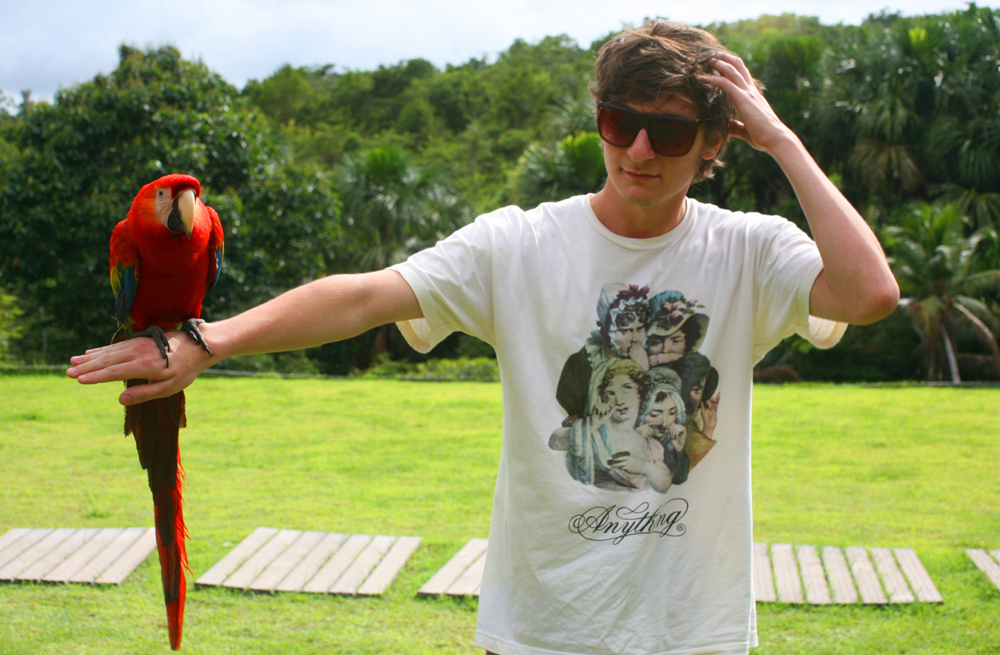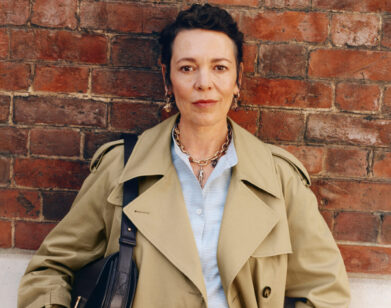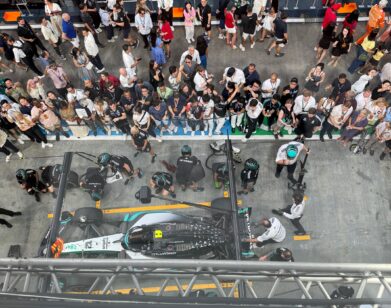Nick of All Trades

Nick Koenig’s apartment
Nick Koenig’s East Village apartment is crowded with instruments. In the building where Philip Glass once lived, the recent Tisch grad is now the principle noisemaker. Sprawled across Koenig’s living room are drums, guitars, a harmonica, countless keyboards, even a (highly coveted) vintage Suzuki Omnichord—in short, a lot of loud toys begging to be played. “My neighbors are very cool about it,” he says. “They get more annoyed by girls wearing high heels in here.”
Watching Koenig fool around with his toys is a bit of an exercise in concentration. He picks up, say, a keyboard, plays a catchy tune, then—just when he’s got you—he puts it down and takes up something else entirely. His rambling style of play is not unlike his varied artistic output: He is, at once and indiscriminately, a stylish filmmaker, a burgeoning music producer, and a talented photographer. His 2008 short film Strawberry-Banana, about a rat-tailed 10-year-old boy named Gus who attempts to cope with summertime’s inevitable heat and boredom, won a Warner Bros. Film Award. The movie is punctuated by Koenig’s original hip hop score, and MC Paul Barman, the “schlemiel rapper,” makes a scene-stealing appearance as an enthusiastic parent. Koenig has also produced songs (under the name Hot Sugar) with Brooklyn MC Louis Logic supplying the rhymes, and he orchestrated Logic’s backing band (Koenig refuses to use the verb “conducted,” despite my best efforts to misquote him) during a packed-to-fire hazard show at Joe’s Pub last week.

All three facets of Koenig’s artistic life—film, music, and photography—will be on display tonight at the Legendary Children event held at the National Arts Club, a rather tweed-and-bow tie place in Gramercy. The downtown plaid-clad get a chance to dress up for a showcase of talent as loose-limbed and free-verse as Koenig’s artistic ruminations. Legendary Children is a relatively new series started in the past year; founders Zach Wigon and Nick Pandolfi have made it their modus operandi to fete young New York noteworthies, like director Ray Tintori, best-known for his trippy music videos for The Band That Was 2008, MGMT. I had a beer with Nick at his apartment as he finalized the playlist for tonight. Our conversation was, predictably, all over the place.
FAN ZHONG: We might as well begin at the beginning. How did you get involved with this Legendary Children business?
NICK KOENIG: Luck. Zach Wigon was a fan of Strawberry-Banana, which he’d heard about through Tisch [School of Arts]. And Nick Pandolfi was a fan of a song of mine he’d heard.
FZ: What does luck have to do with that?
NK: I’m really bad at distributing my work.
FZ: You’re a poor publicist?
NK: I don’t even attempt publicity. I was surprised Nick got a hold of that song. I haven’t been able to trace who leaked it to him. I have hundreds of songs no one’s ever heard.
FZ: That no one’s ever heard or that no one’s attributed to Hot Sugar?
Nick Koenig
NK: No, I never released them. If my apartment burns down, then a hundred songs disappear unheard, Emily Dickinson-style.
FZ: We should kill you now.
NK: But I’m not done with my work yet.
FZ: I don’t think she was, either. [Indicating a stack of photographs] You have all these photos to show, too. That you took in West Africa.
NK: From all over, actually. The only ones that have been shown are the ones I took inside a Liberian refugee camp in Ghana two summers ago. I befriended a bunch of people I’m still in touch with via email. [Holds up a portrait of a man] This guy steals electricity. He wired up a light bulb to an electrical socket that runs from an extension cord.
FZ: He hooks the light bulb straight into the socket? That’s insane.
NK: With the equivalent of a bent paperclip. He gets electrocuted every time he turns the light off. He was a former chainsaw mechanic in Liberia.
FZ: I didn’t know there was such a profession.
NK: It’s crazy because these places don’t have running water or electricity—if they had electricity, it was stolen. But still, everyone’s got an email address.
FZ: It’s like you go to China and there’re a thousand people living in shantytowns and they all have cell phones. They’re squatting on the side of the dusty road in their tattered pants with no shoes, on their Blackberries.
NK: At this camp, everyone has cell phones but they don’t have the electricity to charge them. Which resulted in a lot of, um, micro-industries—one guy had a shack with a generator dripping with hundreds of chargers.
FZ: So everyone would go there to charge their phones?
NK: For pennies by the minute.
FZ: So let’s run down the list. You’ve made all this music, you took these photographs, you made this, frankly, amazing short film.
NK: Basically, the premise of this Legendary Children event is for me to purge all the work I’ve accumulated. Do you want to talk film?
FZ: Sure. The film, Strawberry-Banana, was shot beautifully. Who shot it?
NK: Adam Newport-Berra, who’s amazing.
FZ: In fact, the whole aesthetic of the film—the vibe, even—is very complete. It smacks of auteurship.
NK: It was our whole team, including the production designer, Isabel [de Souza Santos].
FZ: Yeah, the set design is fantastic, the wardrobe too. It’s so early 90s.
NK: The wardrobe’s definitely dated to the early 90s but we wanted the characters to be contemporary. The exteriors were shot in really gritty, industrial parts of New Jersey—places going up and coming down at the same time. So you’ll see a building in rubble with a fresh coat of paint. That’s what I wanted the characters to be like: really flashy, but from an outdated era.
FZ: How did you decide on the setting for the film? It feels very of-that-place, wherever that place is.
NK: I was on a train in the middle of Nowhere, USA, and I was bored. I couldn’t hear any sounds other than the engine of the train. It was just fields and rubble highways passing by. And then I see a pile of bricks on the side of the tracks, unusual for where we were. Suddenly, there’s a thump against the train and women gasp. I see a little kid with a rattail running away—he’d thrown a brick at us—but he was totally alone. That’s usually the type of delinquent mischief that kids do to impress other things, but he was by himself. That was the inspiration for the character, Gus, though it’s not him exactly.
FZ: That’s a great origin story. Why the title Strawberry-Banana? Besides the fact that it’s the drink we see Gus guzzling.
NK: Well … what do you think of when you hear “strawberry-banana”?
FZ: A smoothie. No, a milkshake!
NK: But what does it taste like? Strawberry? Or banana? Or does it taste like strawberry-banana, which is its own entity?
FZ: Wait. What?
NK: When I think of strawberry-banana, it doesn’t taste like the sum of its parts. You can’t really combine them. When you ask a kid about strawberry-banana, they’re going to think of something artificial, like a Now and Later or a Starburst. Kids eat this stuff way more than adults. If you went into a meeting at Interview and asked how many people there had eaten a Purple Berry-flavored food in the past month, I doubt more than one would say they have.
FZ: [Laughs] I can imagine who that one would be, too.
NK: So it means something very specific to kids, something ingrained in and accepted by kids. Another thing is that kids belong to a culture that is deeply involved in video games. And video game characters always have a Power-Up of some sort-like Mario has the mushroom or the Flower Power. So Gus’s Power-Up is the strawberry-banana drink. But none of that is revealed directly in the film.
FZ: Are you working on a new film now?
NK: I’m writing a feature.
FZ: What about your music? You’re working on an EP right now, which you’ll release soon.
NK: Yeah, and I have one song with Louis Logic that I’m going to leak online.
FZ: Do you have a game plan?
NK: A game plan for leaking it? [Laughs] I like how you need a game plan for leaking something now. I don’t know how to properly leak something—I figured I’d send it to blogs.
FZ: You could leak it on interviewmagazine.com.
NK: Why not. Let’s do that.

[Ed note: Unfortunately, the Louis Logic track was not yet finished at the time of this post. Instead, we present you with this song that, “if a Care Bear ever wanted to rap about how they held down cloud Care-a-Lot, I feel like they’d get busy with this beat.”]
FZ: Who else are you working with, besides Lou and Paul Barman?
NK: J-Zone is one of my favorite producers I’ve worked with. He’s super-inspiring—he says he’d rather sample the parts of songs no one else would want to sample. His music is incredibly unique in that way. I played guitars on a track for the Lonely Island record that J-Zone produced featuring E-40, “Santana DVX.”
FZ: You spend a lot of time digging up obscure samples for your songs.
NK: As a hip-hop producer, there’s always pressure to sample obscure material. One my favorites is DJ Premiere sampling a score from a Douglas Fairbanks silent film, which is kind of ridiculous and great. I try to find the most obscure stuff I can, stuff that isn’t even really listenable, and then I try to EQ it and make it melodic. This EP I’m working on relies on sampling sounds from broken instruments-—a busted guitar, a broke-ass piano—and broken recording equipment. My tape recorder has a broken tube in it and peaks whenever a signal passes through it. Most audio engineers or producers would throw that out. I’m trying to recycle it.
FZ: You’re dumpster-diving for inspiration.
NK: Totally. I watch a lot of B movies, movies that are just plain bad, and I try to find something I can take from them. I found a sample in the Emmanuelle series [a cult series of softcore French porn movies based on the novel of the same name by Emmanuelle Arsan], in Emmanuelle vs. The Last Cannibals. In that one, she’s journalist in the Amazon in search of cannibals. To no particular end, she has sex with a bunch of guys on the way—it’s pretty much sexploitation. Anyway, there’s a song during a sex scene that was the most amazing song I’d heard that week, and I wanted to sample it.
FZ: Was it a classic porno song?
NK: Not quite, although porno songs are great.
FZ: I agree.
NK: This one had a string section—a whole choir, actually.
FZ: During a sex scene? That sounds fantastic.
NK: It was! And, of course, it’d already been sampled by one of my inspirations, Danger Mouse. He got there right before I did.
FZ: Interesting that you both came upon that, and at around the same time.
NK: That’s because it’s at the same depth in the dumpster.
FZ: Which is why you’re going deeper.
NK: Which is why I’m at the bottom.
FZ: You’re at the well past expired stage.
The Legendary Children event presenting Nick Koenig will be held tonight with a reception at 8pm, followed by a screening of Strawberry-Banana at 9 PM, at the National Arts Club, located at 15 Gramercy Park South.






